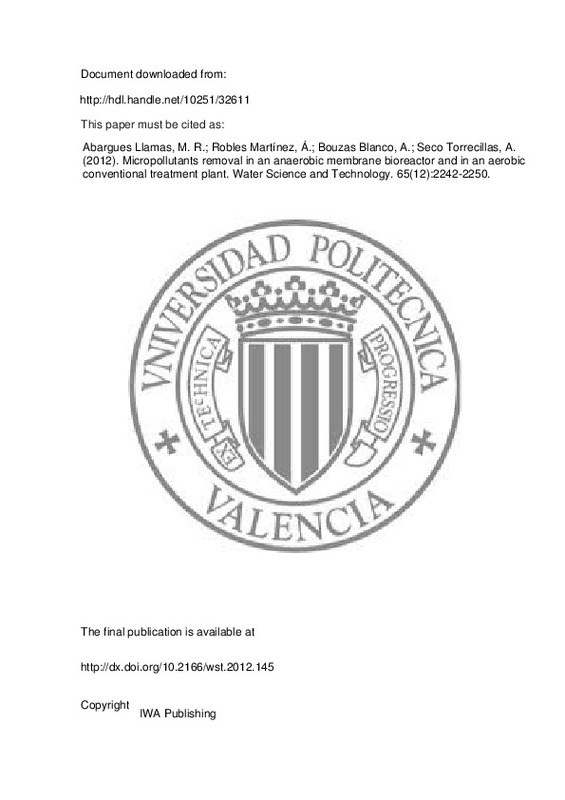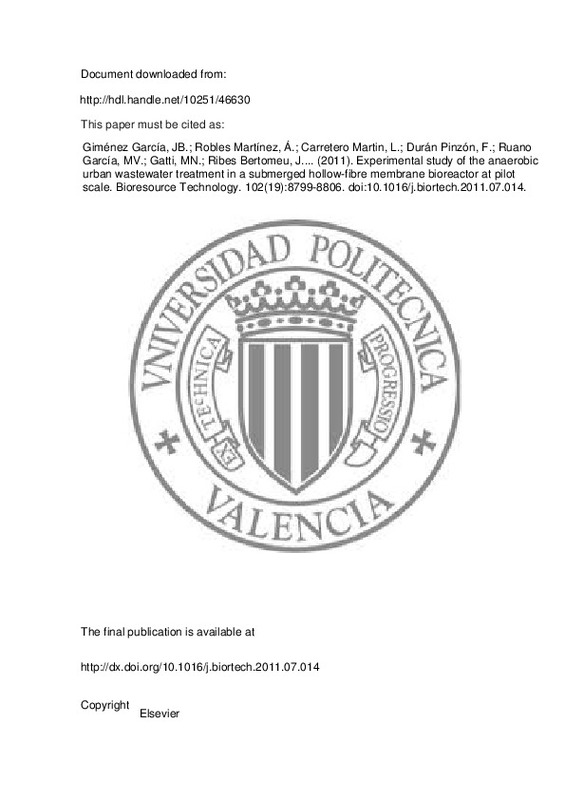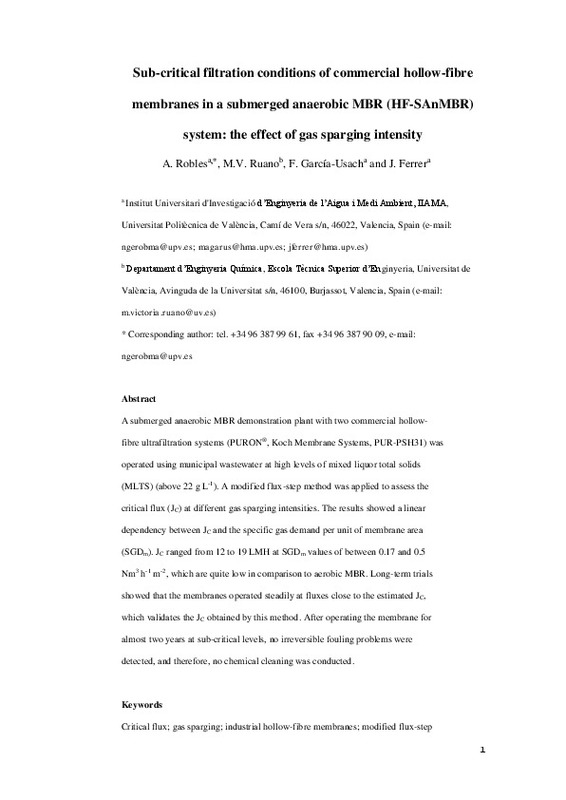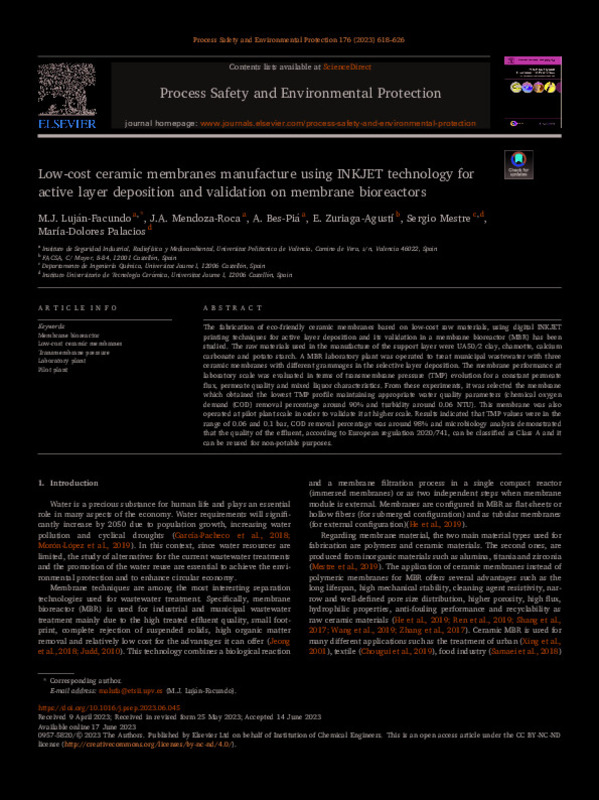Agargues Llamas, MR.; Robles Martínez, Á.; Bouzas Blanco, A.; Seco Torrecillas, A. (2012). Micropollutants removal in an anaerobic membrane bioreactor and in an aerobic conventional treatment plant. Water Science and Technology. 65(12):2242-2250. https://doi.org/10.2166/wst.2012.145
Por favor, use este identificador para citar o enlazar este ítem: http://hdl.handle.net/10251/32611
|
Título:
|
Micropollutants removal in an anaerobic membrane bioreactor and in an aerobic conventional treatment plant
|
|
Autor:
|
Agargues Llamas, Miguel Rafael
Robles Martínez, Ángel
Bouzas Blanco, Alberto
Seco Torrecillas, Aurora
|
|
Entidad UPV:
|
Universitat Politècnica de València. Instituto Universitario de Ingeniería del Agua y del Medio Ambiente - Institut Universitari d'Enginyeria de l'Aigua i Medi Ambient
|
|
Fecha difusión:
|
|
|
Resumen:
|
The paper expresses an attempt to tackle the problem due to the presence of micropollutants in wastewater which may be able to disrupt the endocrine system of some organisms. These kinds of compounds are ubiquitously present ...[+]
The paper expresses an attempt to tackle the problem due to the presence of micropollutants in wastewater which may be able to disrupt the endocrine system of some organisms. These kinds of compounds are ubiquitously present in municipal wastewater treatment plant (WWTP) effluents. The aim of this paper is to compare the fate of the alkylphenols-APs (4-(tert-octyl)) phenol, t-nonylphenol and 4-p-nonylphenol and the hormones (estrone, 17ß-estradiol and 17¿-ethinylestradiol) in a submerged anaerobic membrane bioreactor (SAMBR) pilot plant and in a conventional activated sludge wastewater treatment plant (CTP). The obtained results are also compared with the results obtained in a previous study carried out in an aerobic MBR pilot plant. The results showed that the APs soluble concentrations in the SAMBR effluent were always significantly higher than the CTP ones. Moreover, the analyses of the suspended fraction revealed that the AP concentrations in the SAMBR reactor were usually higher than in the CTP reactor, indicating that under anaerobic conditions the APs were accumulated in the digested sludge. The aerobic conditions maintained both in the CTP system and in the aerobic MBR favoured the APs and hormones degradation, and gave rise to lower concentrations in the effluent and in the reactor of these systems. Furthermore, the results also indicated that the degradation of APs under aerobic conditions was enhanced working at high solid retention time (SRT) and hydraulic retention time (HRT) values. © IWA Publishing 2012.
[-]
|
|
Palabras clave:
|
Activated sludge plant
,
Alkylphenols
,
Endocrine disruptor
,
Estrogenic hormones
,
Membrane bioreactor
,
Activated sludge plants
,
Bioreactors
,
Degradation
,
Endocrinology
,
Hormones
,
Phenols
,
Pilot plants
,
Sewage pumping plants
,
Water treatment plants
,
Effluents
,
(4 (tert octyl)) phenol
,
3 nonylphenol
,
4 nonylphenol
,
Alkylphenol polyoxyethyl ether
,
Estradiol
,
Estrone
,
Ethinylestradiol
,
Phenol derivative
,
Unclassified drug
,
Anoxic conditions
,
Bioreactor
,
Hormone
,
Membrane
,
Oxic conditions
,
Pollutant removal
,
Waste treatment
,
Activated sludge
,
Anaerobic membrane bioreactor
,
Article
,
Chemical structure
,
Extraction
,
Mass fragmentography
,
Pollutant
,
Waste water management
,
Waste water treatment plant
,
Water sampling
,
Anaerobiosis
,
Chromatography, Gas
,
Limit of Detection
,
Membranes, Artificial
,
Solid Phase Microextraction
,
Water Pollutants
|
|
Derechos de uso:
|
Reserva de todos los derechos
|
|
Fuente:
|
Water Science and Technology. (issn:
0273-1223
)
|
|
DOI:
|
10.2166/wst.2012.145
|
|
Editorial:
|
IWA Publishing
|
|
Versión del editor:
|
http://dx.doi.org/10.2166/wst.2012.145
|
|
Código del Proyecto:
|
info:eu-repo/grantAgreement/MICINN//CTM2008-06809-C02-01/ES/ESTUDIO EN PLANTA PILOTO DE LA APLICACION DE LA TECNOLOGIA DE MEMBRANAS PARA LA VALORIZACION ENERGETICA DE LA MATERIA ORGANICA DEL AGUA RESIDUAL Y LA MINIMIZACION DE LOS FANGOS PRODUCIDOS. EVALUACION/
|
|
Agradecimientos:
|
This research was financially supported by the Government of the Region of Valencia (Generalitat Valenciana), within the research project 'Application of Water Framework Directive 2000/60/EC on endocrine disruptors and ...[+]
This research was financially supported by the Government of the Region of Valencia (Generalitat Valenciana), within the research project 'Application of Water Framework Directive 2000/60/EC on endocrine disruptors and priority substances in coastal areas in the Comunidad Valenciana' and by the Spanish Research Foundation (MICINN, project CTM2008-060809-C02-01/TECNO), within the research project 'Feasibility of the SAMBR technology to treat urban wastewater, and the technical and economic feasibility to industrial implementation'.
[-]
|
|
Tipo:
|
Artículo
|







![[Cerrado]](/themes/UPV/images/candado.png)




